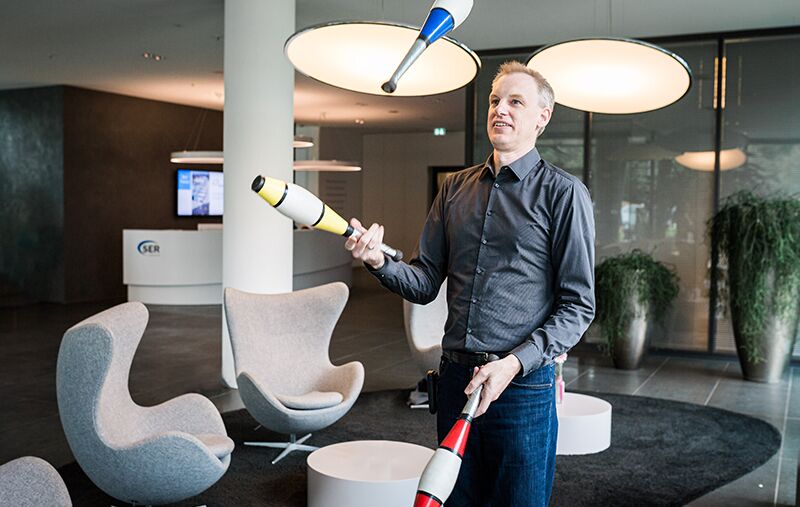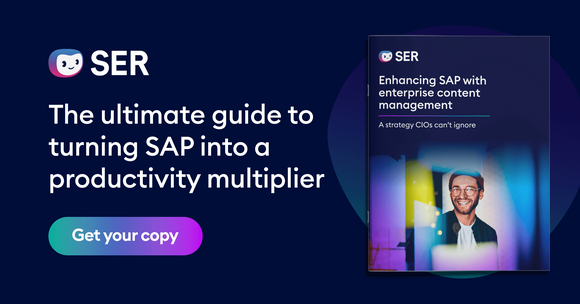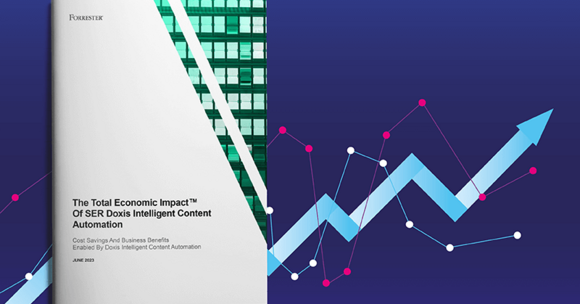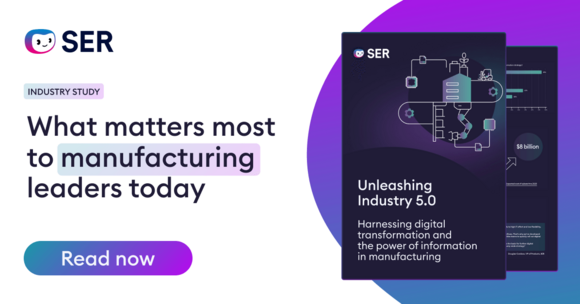SER Blog Innovation & Technology
Chief Tech Talk: "AI is a real game-changer"
Welcome to our first Chief Tech Talk! It's our new series in which Dr. Gregor Joeris, Chief Technology Officer of the SER Group, tackles (or, in today's interview, juggles) the big tech topics currently facing companies in their information management. Today, Gregor talks with Dominik Adams, Head of SER Product Marketing and member of SER’s Innovation Team, about the rising applicability of AI in information management. While AI technology has recently become a more accessible and valuable tool for businesses, it comes with risks if you aren’t well prepared or don't have the right expertise. In this Chief Tech Talk, Gregor and Dominik point companies in the right direction.

Adams: Over the last couple of years there has been a lot of hype surrounding AI and all the amazing benefits it will bring (or is already bringing) companies. In an enterprise context, AI is promising companies a lot of advantages, like automated routine tasks, better customer service, smart tools for users. Are AI and information management the perfect partners?
Joeris: I’d go even a step further: I see AI, ECM and BPM as inseparable. To achieve intelligent and learning information management, you have to connect content and processes combined with the right analytical approach. That’s why we’ve been using and expanding intelligent methods for content analytics in Doxis for a long time now.
"The capabilities will grow"
Adams: Our customers have been benefiting from machine-learning methods in processing incoming mail, email and invoices for many years now — to classify, distribute, read and process data, also fully automated. What do you see as the next step for them?
Joeris: One logical next step for many customers could be to use AI, for example, to optimize dispatching and response times in customer service. On the technological side, we have already anticipated the next steps by embedding cognitive services into the core of our platform. Future use cases will still support all inbound scenarios – even expanding to include chats, social media, etc. On top of that, however, Doxis Cognitive Services will also allow our customers to analyze all of their data uniformly, to extract information from documents, audio and video, to recognize named entities, detect sentiments and much more. And that’s just the start – the capabilities will grow when we add new technologies.
"We develop software for people"
Adams: What you’re saying is that there is practically an unlimited number of use cases for AI and machine learning on a content services platform, right? Considering that about 80 percent of all data in a company is unstructured, there is so much to be gained by analyzing and understanding it. For example, by identifying people, companies, places, etc. in documents, the insights can be utilized to fulfill, say, the requirements of the EU GDPR. But machine learning can also shed light on risks, like when a contract contains a clause that is no longer valid. Where else do you see benefits?
Joeris: We develop software for people. So when we design and develop our software enhanced with AI, a big focus for us is the user: How can we make their daily work easier and faster? How can AI give them important insights into the vast pools of information at their company? One way is through metadata: With software like Doxis, documents, eFiles and process are enriched with metadata automatically. The system helps them to find experts on specific areas or to identify similar or supplemental documents or files, and so much more. Doxis can be the user’s personal assistant.

Adams: Generally speaking, the democratization of AI, or the rising applicability of AI in an enterprise context, is a truly positive development. This is a real game-changer for companies.
"AI is only as intelligent as the data behind it"
Joeris: For sure! But they need to be aware that AI is only as intelligent as the data behind it. Companies want machine-learning methods that lead to reliable results based on a relatively small set of data. The quality of the data, however, is what they should be concerned about: If your information is trivial, outdated or redundant, there is a good chance that your AI will come to the wrong conclusions.
Adams: And what about unstructured text? Many methods currently being applied out there work well with structured data or images, but not so much with text. If you think that using any available algorithm will get you to your goal quickly, you are bound to be disappointed. When it comes to analyzing unstructured texts in particular, you need experience and expertise on your side.
Joeris: I totally agree, Dominik. Companies need to carefully observe and critically check AI judgments and decisions. We rely on methods that offer the optimal level of accuracy, speed, effort and costs. Minimal improvements in recognition rates often entail a huge amount of effort – which for giants like Facebook and Google is acceptable, but for everyone else not always. Another essential point here is the predictability and accountability of the results. Many machine-learning methods are a black box. If you don’t know how mistakes were made, then you’ll hardly be able to correct them. You won’t know how AI will, for example, analyze documents that you never even knew existed in your company. This happens all the time in daily business, might I add.
"Mistakes in data could become very expensive"
Adams: Transparency and accountability when using AI methods are not just important from the perspective of data protection — but also the entire business context. This is often forgotten in all the excitement about AI innovations. In cases where the data quality hasn’t been good enough, we already have heard in the media about some hair-raising results— from racist chat bots to discriminatory application processes. This is bad enough. For a business, what’s even more dangerous happens often in a much less obvious way: If AI influences a business decision, mistakes in data could become very expensive. The only way to prevent these worst-case scenarios is to know how AI reaches its decisions and which information forms the basis of the decision process.
Joeris: As you said earlier, experience and expertise are a must when using AI in an enterprise context. Sure, you can set loose freely accessible neural networks on your data— but you won’t get very good results. At SER, we have over 20 years of experience with various machine-learning and rule-based methods and know how they should be used to generate top results.
"The right technological foundation is so crucial!"

Adams: I think companies should really strive to look at the big picture here: Especially when it comes to AI and digital workflows, the right technological foundation is so crucial! With a unified content services platform — with consistent metadata management and integrated ECM and BPM — companies create the basis for future-ready information and process management. This kind of platform is ready to take on, for instance, new machine-learning-based services when they’re ready. And it enables companies to consolidate and manage high-quality data.
Joeris: We’ve seen too often what happens when companies instead make the hasty decision to launch individual applications for special requirements: the problems of isolated and chaotic file storage, like from the file system, are simply passed on to the information management system. When you gain speed by deploying isolated departmental solutions, you only end up multiplying your information silos. Which means more chaos, and your vision of an end-to-end information infrastructure goes up in smoke. I call this increased inefficiency!
Want to learn more about artificial intelligence and machine learning on the Doxis platform? Continue reading here.
Interested in hearing CTO Dr. Gregor Joeris and Dominik Adams live? Your next opportunity will be at the From Now to the Digital Future event in Essen on July 2, 2019. (event in German)

Dr. Gregor Joeris
In addition to his role as a Managing Director of SER Group Holding International GmbH, Dr. Gregor Joeris is also the innovative mind behind SER's technologies & products. Gregor studied Computer Science at RWTH Aachen University and received his PhD in Bremen, Germany. As the Chief Technology Officer and a Managing Director of SER Software Technology GmbH, Gregor is responsible for the design and further development of SER's flagship product Doxis.
The latest digitization trends, laws and guidelines, and helpful tips straight to your inbox: Subscribe to our newsletter.
How can we help you?
+49 (0) 30 498582-0Your message has reached us!
We appreciate your interest and will get back to you shortly.




